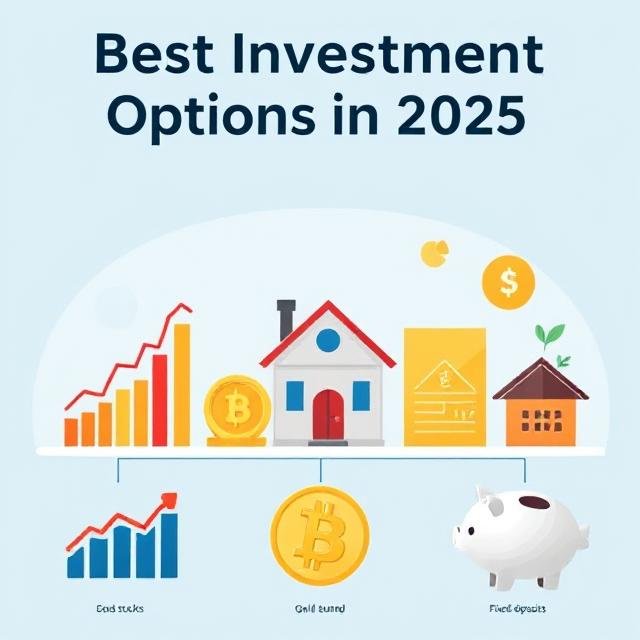Best Investment Options in 2025: Where Should You Put Your Money?
As we step into 2025, the world of investment continues to evolve rapidly. With changing economic conditions, new technologies, and shifting market dynamics, choosing the right investment option has become more crucial than ever. Whether you are a beginner or an experienced investor, knowing where to invest your money in 2025 can help you maximize returns while managing risks effectively.
In this blog, brought to you by Investment Diaries, we will explore the best investment options available in 2025, their benefits, risks, and how you can make a smart choice based on your financial goals.
1. Mutual Funds: A Smart Choice for Steady Growth
Mutual funds remain one of the most popular investment vehicles in 2025, particularly for those seeking professional management without the need to select individual stocks. They pool money from multiple investors and invest in a diversified portfolio of stocks, bonds, or other securities.
- Equity Mutual Funds: These invest primarily in stocks and offer higher returns over the long term. Ideal for investors with a higher risk appetite. If you’re new to mutual funds, check out our detailed guide on How to Start Investing in Mutual Funds.
- Debt Mutual Funds: Focus on fixed-income instruments like government bonds and corporate debt, offering lower risk but more stable returns.
- Hybrid Funds: Combine both equity and debt, balancing risk and reward effectively.
A great way to invest in mutual funds is through Systematic Investment Plans (SIPs), where you invest a fixed amount regularly. SIPs help in rupee cost averaging and reduce the impact of market volatility.
2. Stock Market: High Risk, High Reward
Direct investment in stocks can potentially yield high returns, but it requires research, patience, and a good understanding of market trends. In 2025, stock markets will remain attractive due to economic recovery and technological advancements.
- Blue-chip stocks: Shares of well-established companies with stable earnings. They are less volatile and ideal for conservative investors.
- Mid-cap and Small-cap stocks: These have higher growth potential but come with increased risk.
If you’re new to stocks, consider starting small and diversifying your portfolio to manage risk effectively. Want to learn more about stock market basics? Please read our blog on Stock Market Investing for Beginners.
3. Real Estate: Tangible Asset for Long-Term Wealth
Real estate has always been a preferred investment for building long-term wealth. Despite fluctuations, owning property provides both rental income and capital appreciation.
- Residential Properties: Can generate rental income and appreciate over time.
- Commercial Properties: Usually require a larger investment but offer steady rental yields.
Before investing, assess the location, market demand, and legal clearances to ensure good returns. Explore our latest post on Tips for Investing in Real Estate in 2025 to make informed decisions.
4. Gold: The Traditional Safe Haven
Gold has historically been a hedge against inflation and currency fluctuations. In 2025, gold continues to be a vital part of a diversified portfolio.
You can invest in physical gold, but alternatives like Gold ETFs and Sovereign Gold Bonds (SGBs) offer more convenience and security.
SGBs even offer an additional interest component, making them attractive for investors seeking steady returns.
Gold is particularly useful during times of economic uncertainty. To understand gold investments better, visit our article on Investing in Gold: Physical vs Digital.
5. Cryptocurrencies: Emerging but Volatile
Cryptocurrency remains a hot topic in 2025, attracting investors with its potential for massive gains. However, it is also one of the most volatile and risky investment options.
- Popular coins like Bitcoin and Ethereum are generally considered safer within the crypto space.
- Regulatory frameworks are still evolving, so keeping an eye on government policies is essential.
If you choose to invest, only allocate a small portion of your portfolio and be prepared for significant price swings. Curious about crypto? Check out A Beginner’s Guide to Cryptocurrency.
6. National Pension Scheme (NPS): Secure Your Retirement
NPS is an excellent retirement-focused investment backed by the government, offering tax benefits and disciplined savings.
- It allows you to invest in a mix of equity, corporate bonds, and government securities.
- Offers tax deductions under Section 80C and additional benefits under Section 80CCD.
NPS is a low-cost way to build a retirement corpus with potentially higher returns than traditional fixed deposits. Learn how to plan your retirement effectively with our guide on National Pension Scheme Explained.
7. Fixed Deposits & Recurring Deposits: Safe but Lower Returns
For risk-averse investors, Fixed Deposits (FDs) and Recurring Deposits (RDs) remain popular due to their guaranteed returns and capital protection.
- The interest rates might be lower compared to inflation, but they provide stability.
- Ideal for parking emergency funds or short-term savings.
These instruments should form only a part of a diversified portfolio in 2025.
Final Thoughts: Diversification is Key
The “best” investment option in 2025 depends on your financial goals, risk tolerance, and investment horizon. No single investment is perfect for everyone. A well-diversified portfolio that includes a mix of mutual funds, stocks, real estate, gold, and safer instruments like NPS or FDs is the best way to balance risk and return.
Always keep yourself updated about market trends and review your investment portfolio regularly to make adjustments as needed.
At Investment Diaries, we are committed to helping you make informed and smart investment decisions through our expert blogs and guides. Remember, successful investing is not about chasing the highest returns but about consistent, informed decisions that align with your financial goals.
Would you like me to help you with the URLs or formatting for your site?




